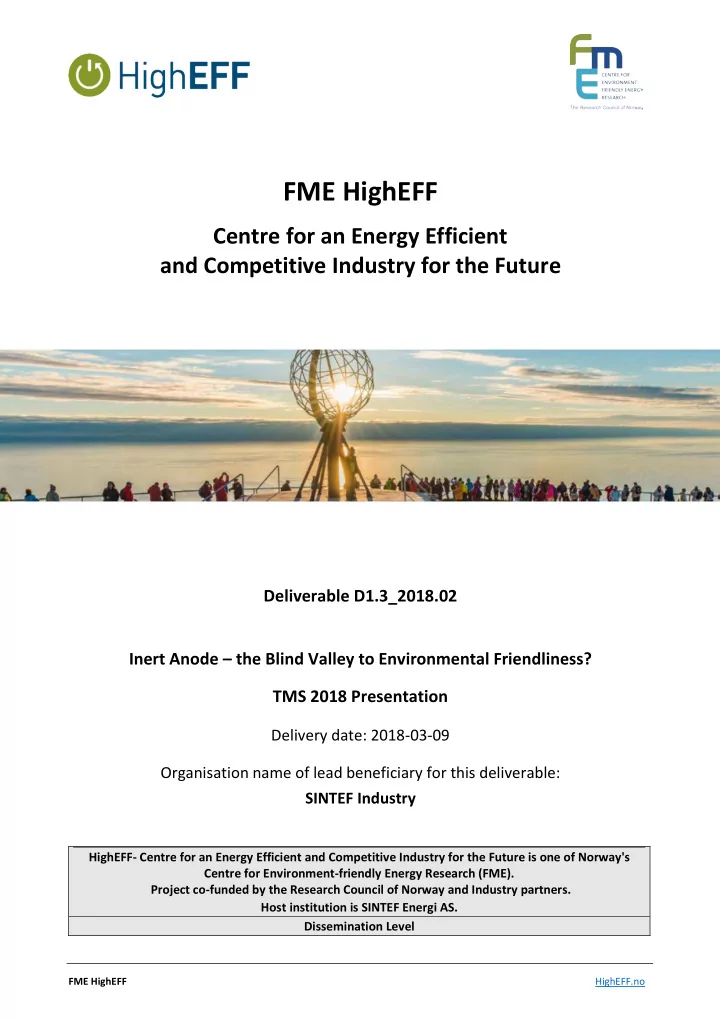

FME HighEFF Centre for an Energy Efficient and Competitive Industry for the Future Deliverable D1.3_2018.02 Inert Anode – the Blind Valley to Environmental Friendliness? TMS 2018 Presentation Delivery date: 2018-03-09 Organisation name of lead beneficiary for this deliverable: SINTEF Industry HighEFF- Centre for an Energy Efficient and Competitive Industry for the Future is one of Norway's Centre for Environment-friendly Energy Research (FME). Project co-funded by the Research Council of Norway and Industry partners. Host institution is SINTEF Energi AS. Dissemination Level FME HighEFF HighEFF.no
PU Public X RE Restricted to a group specified by the consortium D1.3_2018.02 Page 2 of 18
Deliverable number: D1.3_2018.02 ISBN number: Deliverable title: Inert Anode – the blind valley to environmental friendliness? TMS 2018 presentation. Work package: WP1.3 Deliverable type: CP Lead participant: SINTEF Industry Quality Assurance, status of deliverable Action Performed by Date Verified (WP leader) Asbjørn Solheim 2018-02-01 Egil Skybakmoen Reviewed (RA leader) 2018-03-01 Approved (dependent on nature Hydro September 2017 of deliverable)* ) * ) The quality assurance and approval of HighEFF deliverables and publications have to follow the established procedure. The procedure can be found in the HighEFF eRoom in the folder "Administrative > Procedures". Authors Author(s) Name Organisation E-mail address Asbjørn Solheim SINTEF Industry Asbjorn.solheim@sintef.no D1.3_2018.02 Page 3 of 18
Abstract The introduction of inert anodes in alumina reduction cells may bring about some advantages, but also a number of serious drawbacks. In view of the developments in the Hall-Héroult process during the last decades, it was considered desirable to make a critical evaluation of the inert anode concept as compared to state-of-the-art electrolysis cells. It was found that the DC energy consumption will be about 3 kWh/kg Al higher with inert anodes, partly because the 1 V higher isothermal cell voltage cannot be fully compensated, but mainly because a cell with inert anodes requires similar heat loss as a cell with carbon anodes. Consequently; the total carbon dioxide footprint will be higher with inert anodes when the power is generated in a coal fired plant, while there is not much difference if the power comes from a gas fired plant. The full carbon dioxide reduction potential with inert anodes can only be realized when using renewable energy sources. However, a Hall-Heroult plant with carbon capture and sequestration will still require less electric power than a plant with inert anodes. The paper was delivered in 2017. Here is attached the conference presentation performed 13 March 2018 in Phoenix, US. D1.3_2018.02 Page 4 of 18
D1.3_2018.02 Page 5 of 18
D1.3_2018.02 Page 6 of 18
D1.3_2018.02 Page 7 of 18
D1.3_2018.02 Page 8 of 18
D1.3_2018.02 Page 9 of 18
D1.3_2018.02 Page 10 of 18
D1.3_2018.02 Page 11 of 18
D1.3_2018.02 Page 12 of 18
D1.3_2018.02 Page 13 of 18
D1.3_2018.02 Page 14 of 18
D1.3_2018.02 Page 15 of 18
D1.3_2018.02 Page 16 of 18
D1.3_2018.02 Page 17 of 18
D1.3_2018.02 Page 18 of 18
Recommend
More recommend